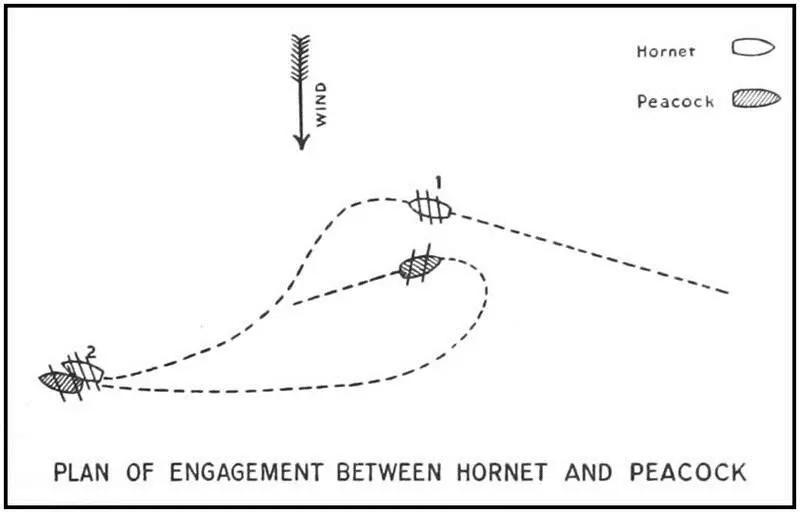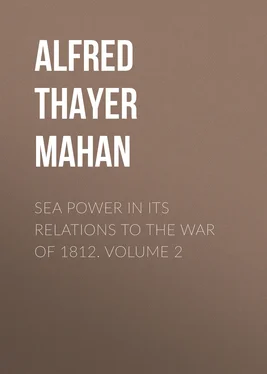Alfred Thayer Mahan - Sea Power in its Relations to the War of 1812. Volume 2
Здесь есть возможность читать онлайн «Alfred Thayer Mahan - Sea Power in its Relations to the War of 1812. Volume 2» — ознакомительный отрывок электронной книги совершенно бесплатно, а после прочтения отрывка купить полную версию. В некоторых случаях можно слушать аудио, скачать через торрент в формате fb2 и присутствует краткое содержание. Жанр: foreign_prose, История, foreign_edu, foreign_antique, на английском языке. Описание произведения, (предисловие) а так же отзывы посетителей доступны на портале библиотеки ЛибКат.
- Название:Sea Power in its Relations to the War of 1812. Volume 2
- Автор:
- Жанр:
- Год:неизвестен
- ISBN:нет данных
- Рейтинг книги:5 / 5. Голосов: 1
-
Избранное:Добавить в избранное
- Отзывы:
-
Ваша оценка:
- 100
- 1
- 2
- 3
- 4
- 5
Sea Power in its Relations to the War of 1812. Volume 2: краткое содержание, описание и аннотация
Предлагаем к чтению аннотацию, описание, краткое содержание или предисловие (зависит от того, что написал сам автор книги «Sea Power in its Relations to the War of 1812. Volume 2»). Если вы не нашли необходимую информацию о книге — напишите в комментариях, мы постараемся отыскать её.
Sea Power in its Relations to the War of 1812. Volume 2 — читать онлайн ознакомительный отрывок
Ниже представлен текст книги, разбитый по страницам. Система сохранения места последней прочитанной страницы, позволяет с удобством читать онлайн бесплатно книгу «Sea Power in its Relations to the War of 1812. Volume 2», без необходимости каждый раз заново искать на чём Вы остановились. Поставьте закладку, и сможете в любой момент перейти на страницу, на которой закончили чтение.
Интервал:
Закладка:
The superiority in broadside weight of fire of the "Constitution" over the "Java" was about the same as over the "Guerrière." The "Java's" crew was stronger in number than that of the "Guerrière," mustering about four hundred, owing to having on board a hundred supernumeraries for the East India station, to which the ship was ultimately destined. On the other hand, the material of the ship's company is credibly stated to have been extremely inferior, a condition frequently complained of by British officers at this late period of the Napoleonic wars. It has also been said, in apparent extenuation of her defeat, that although six weeks out from England, having sailed November 12, and greater part of that time necessarily in the trade winds, with their usual good weather, the men had not been exercised in firing the guns until December 28, the day before meeting the "Constitution," when six broadsides of blank cartridges were discharged. Whatever excuse may exist in the individual instance for such neglect, it is scarcely receivable in bar of judgment when disaster follows. No particular reason is given, except "the many services of a newly fitted ship, lumbered with stores;" for in such latitudes the other allegation, "a succession of gales of wind since the day of departure," 5 5 James' Naval History, edition 1824, vol. v. p. 313.
is incredible. On broad general grounds the "Java" needed no apology for being beaten by a ship so much heavier; and the "Constitution's" loss in killed and wounded was over double that suffered from the "Guerrière" four months before, when the American ship had substantially the same crew. 6 6 Bainbridge in a private letter speaks of the men looking forward to prize money for the "Guerrière" on their return. Niles' Register, vol. iii. p. 411.
Further, Bainbridge reported to his Government that "the damage received in the action, but more especially the decayed state of the "Constitution," made it necessary to return to the United States for repairs." Although Lieutenant Chads, who succeeded Lambert, was mistaken in supposing the American ship bound to the East Indies, he was evidently justified in claiming that the stout resistance of the "Java" had broken up the enemy's cruise, thus contributing to the protection of the British commerce.
The "Java" was considered by Bainbridge too much injured to be worth taking to the United States. She was therefore set on fire December 31, and the "Constitution" went back to Bahia, where the prisoners were landed under parole. Thence she sailed for home January 6, 1813, reaching Boston February 27. Before his departure the Commodore directed Lawrence to blockade Bahia as long as seemed advisable, but to beware of a British seventy-four, said to be on the coast. When it became expedient, he was to quit the position and move northward; first off Pernambuco, and thence to the coast of Cayenne, Surinam, and Demerara, a favorite cruising ground for American commerce-destroyers. The "Hornet" was to be in Boston in the first fortnight of April.
In pursuance of these discretionary orders Lawrence remained off Bahia for eighteen days, till January 24, when the expected seventy-four, the "Montagu," appeared, forcing him into the harbor; but the same night he came out, gave her the slip, and proceeded on his cruise. On February 24, off the Demarara River, he encountered the British brig of war "Peacock," a vessel of the same class as the "Frolic," which was captured a few months before by the "Wasp," sister ship to the "Hornet." There was no substantial difference in size between these two approaching antagonists; but, unfortunately for the equality of the contest, the "Peacock" carried 24-pounder carronades, instead of the 32's which were her proper armament. Her battery power was therefore but two thirds that of the "Hornet." The vessels crossed on opposite tacks, exchanging broadsides within half pistol-shot, the "Hornet" to windward(1). The "Peacock" then wore; observing which, Lawrence kept off at once for her and ran on board her starboard quarter (2). In this position the engagement was hot for about fifteen minutes, when the "Peacock" surrendered, hoisting a flag union down, in signal of distress. She had already six feet of water in the hold. Being on soundings, in less than six fathoms, both anchored, and every effort was made to save the British vessel; but she sank, carrying down nine of her own crew and three of the "Hornet's." Her loss in action was her commander and four men killed, and twenty-nine wounded, of whom three died; that of the American vessel, one killed and two wounded. The inequality in armament detracts inevitably from glory in achievement; but the credit of readiness and efficiency is established for Lawrence and his crew by prompt action and decisive results. So, also, defeat is not inglorious under such odds; but it remains to the discredit of the British commander that his ship did no more execution, when well within the most effective range of her guns. In commenting upon this engagement, after noticing the dandy neatness of the "Peacock," James says, "Neglect to exercise the ship's company at the guns prevailed then over two thirds of the British navy; to which the Admiralty, by their sparing allowance of powder and shot for practice, were in some degree instrumental."
With the survivors of the "Peacock," and prisoners from other prizes, Captain Lawrence found himself now with two hundred and seventy-seven souls on board and only thirty-four hundred gallons of water. There was at hand no friendly port where to deposit his captives, and provisions were running short. He therefore steered for the United States, and arrived at Holmes' Hole on March 19. 7 7 Lawrence's Report of these transactions is in Captains' Letters, March 19, 1813. It will be found also in Niles' Register, vol. iv. p. 84.

PLAN OF ENGAGEMENT BETWEEN HORNET AND PEACOCK
The capture of the "Peacock" was the last of five naval duels, three between frigates and two between sloops, all favorable in issue to the United States, which took place in what may justly be considered the first of the three periods into which the War of 1812 obviously divides. Great Britain, long reluctant to accept the fact of war as irreversible, did not begin to put forth her strength, or to exercise the measures of repression open to her, until the winter of 1812-13 was drawing to a close. On October 13, convinced that the mere news of the revocation of the Orders in Council would not induce any change in the American determination, the hitherto deferred authority for general reprisals was given; but accompanying them was an express provision that they were not to be understood as recalling the declaration which Warren had been commissioned to make, in order to effect a suspension of hostilities. 8 8 Naval Chronicle, vol. xxviii. p. 305.
On November 27, however, hopes from this source having apparently disappeared, directions were sent the admiral to institute a rigorous commercial blockade of Delaware and Chesapeake bays, 9 9 Admiralty to Warren, British Records Office.
the usual public notification of the fact to neutral Powers, for the information of their shipping affected by it, being issued December 26, three days before the action between the "Constitution" and "Java." On February 21, three days before the "Hornet" sank the "Peacock," Warren wrote that in compliance with the orders of November 27 this blockade had been put in force. The ship "Emily," from Baltimore for Lisbon, under a British license, with a cargo of flour, was turned back when attempting to go to sea from the Chesapeake, about February 5; Warren indorsing on her papers that the bay had been placed under rigorous blockade the day before. 10 10 Niles' Register, vol. iii. p. 383.
Captain Stewart, the senior United States officer at Norfolk, notified his Government of these facts on February 10. 11 11 Captains' Letters.
Soon after, by an Order in Council dated March 30, the measure was extended to New York, Charleston, Port Royal, Savannah, and the Mississippi River. 12 12 Niles' Register, vol. iv. p. 159. The Admiralty's letter to Warren to institute this blockade is dated March 25. British Records Office.
Later in the year Warren, by a sweeping proclamation, dated November 16, 13 13 Niles' Register, vol. v. p. 264.
widened its scope to cover Long Island Sound, inside of Montauk and Black Point; the latter being on the Connecticut shore, eight miles west of New London. From thence it applied not only to the ports named, but to all inlets whatsoever, southward, as far as the Florida boundary. Narragansett Bay and the rest of New England remained still exempt.
Интервал:
Закладка:
Похожие книги на «Sea Power in its Relations to the War of 1812. Volume 2»
Представляем Вашему вниманию похожие книги на «Sea Power in its Relations to the War of 1812. Volume 2» списком для выбора. Мы отобрали схожую по названию и смыслу литературу в надежде предоставить читателям больше вариантов отыскать новые, интересные, ещё непрочитанные произведения.
Обсуждение, отзывы о книге «Sea Power in its Relations to the War of 1812. Volume 2» и просто собственные мнения читателей. Оставьте ваши комментарии, напишите, что Вы думаете о произведении, его смысле или главных героях. Укажите что конкретно понравилось, а что нет, и почему Вы так считаете.












